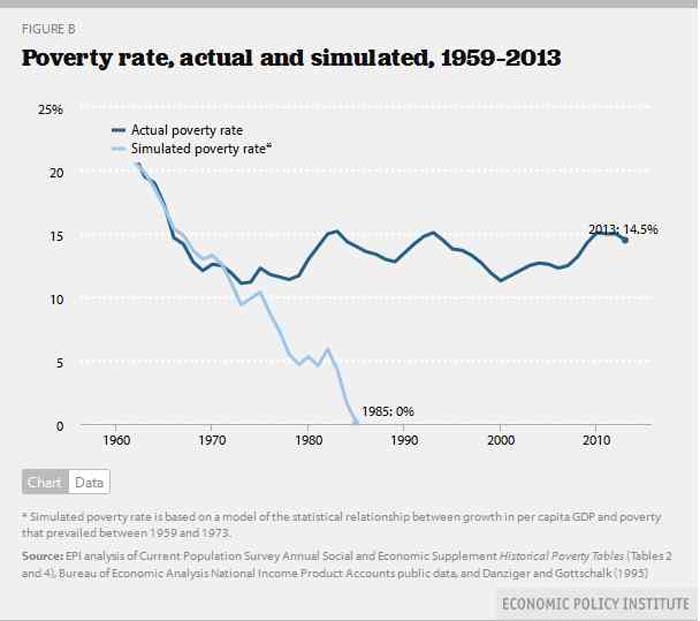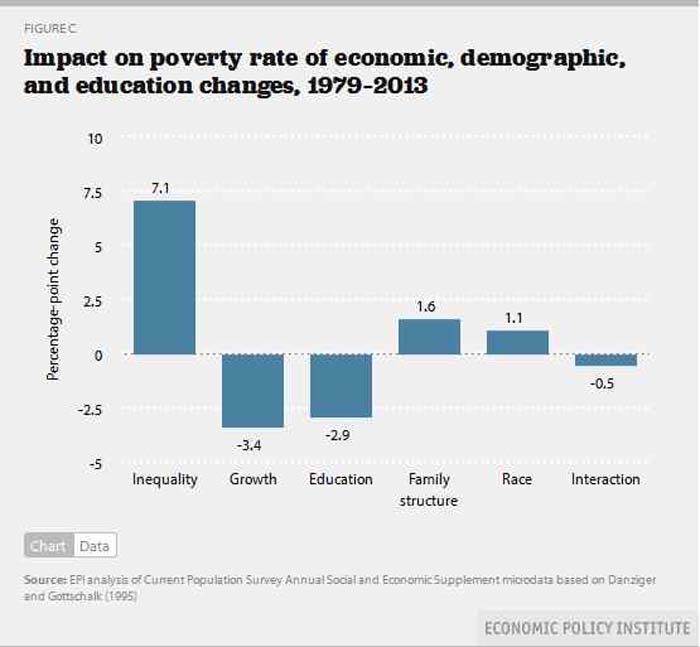|
|
|
|

|
|
|
By Alyssa Davis
Economic Policy Institute

"Despite our growing economy and the
fact that poor workers are now more educated
than ever, rising inequality has worked to
keep low-income people in poverty."

|
|
Despite
our growing economy and the fact that poor workers are now more
educated than ever, rising inequality has worked to keep low-income
people in poverty. This increase in inequality was driven by stagnating
wages for low- and middle-income households. Since 1979 increasing
inequality has been the largest poverty-boosting factor, outweighing
racial identity and family structure and completely eclipsing the
effects of overall economic growth and educational attainment.

Poverty rate, actual and simulated, 1959–2013, EPI
When
assigning blame for our nation’s persistent poverty problem, many
policymakers tend to focus on underlying demographics or behavior of
the poor - factors like racial background or the rise of single parent
households, instead of the stark economic reality the poorest Americans
have to contend with. While demographics and individual behavior have a
place in the policy discussion, growing inequality is the primary
reason the poverty rate has remained elevated over the last several
decades.
The chart below breaks down the poverty rate and shows how demographic
and economic factors affected the poverty rate between 1979 and 2013.
Since 1979, increasing inequality has been the largest poverty-boosting
factor, outweighing racial identity and family structure and completely
eclipsing the effects of overall economic growth and educational
attainment in driving down the poverty rate. Despite our growing
economy and the fact that poor workers are now more educated than ever,
rising inequality has worked to keep low-income people in poverty. This
increase in inequality was driven by stagnating wages for low-and
middle-income households (for example, 10th percentile real wages were
actually lower in 2013 than they were in 1979).

My recent paper, Broad-Based Wage Growth is a Key Tool in the Fight
against Poverty, written along with Elise Gould and Will Kimball, looks
at how the lack of wage growth for low- and middle-income families
fuels poverty. We show what could have happened to poverty if wages had
actually grown over the last several decades and if the poor and the
middle class had shared more widely in the gains made by a growing
economy. We find that adopting policies to promote full employment and
significant wage growth could bring down poverty as much as 4.2
percentage points - bringing 11.2 million people out of poverty.
It’s not fair to say the poor aren’t holding up their end of the social
contract when almost two-thirds of employable poor people work and over
40 percent work full time (and their incomes have become more and more
dependent upon wages over time). The truth is that the economy the poor
are working in - an economy which has grown more and more unequal over
the last several decades - has made it harder and harder for them to get
by.
Instead of focusing on the characteristics of the poor when assigning
blame for poverty, we should examine the policy choices we have made
that led to such an unequal economy. Going forward, we should
focus on policy solutions that will spur wage growth - such as raising
the minimum wage, targeting full employment, strengthening worker’s
bargaining power, and updating labor standards - in order to make our
economy work for all.
|
BC Guest Commentator Elise Gould, is Economic Policy Institute
senior economist, joined EPI in 2003 and is the institute’s director of
health policy research. Her research areas include wages, poverty,
economic mobility, and health care. She is a co-author of The State of
Working America, 12th Edition. In the past, she has authored a chapter
on health in The State of Working America 2008/09; co-authored a book
on health insurance coverage in retirement; published in venues such as
The Chronicle of Higher Education, Challenge Magazine, and Tax Notes;
and written for academic journals including Health Economics, Health
Affairs, Journal of Aging and Social Policy, Risk Management &
Insurance Review, Environmental Health Perspectives, and International
Journal of Health Services. She holds a master’s in public affairs from
the University of Texas at Austin and a Ph.D. in economics from the
University of Wisconsin at Madison. Contact EPI.
|
|
|
|
|
|
|
 |
|
|
|
 is published every Thursday is published every Thursday |
Executive Editor:
David A. Love, JD |
Managing Editor:
Nancy Littlefield, MBA |
Publisher:
Peter Gamble |
|
|
|
|
|
|
|
|
|
|
 |
|
|
|
|
|
|

